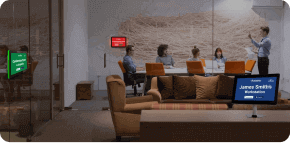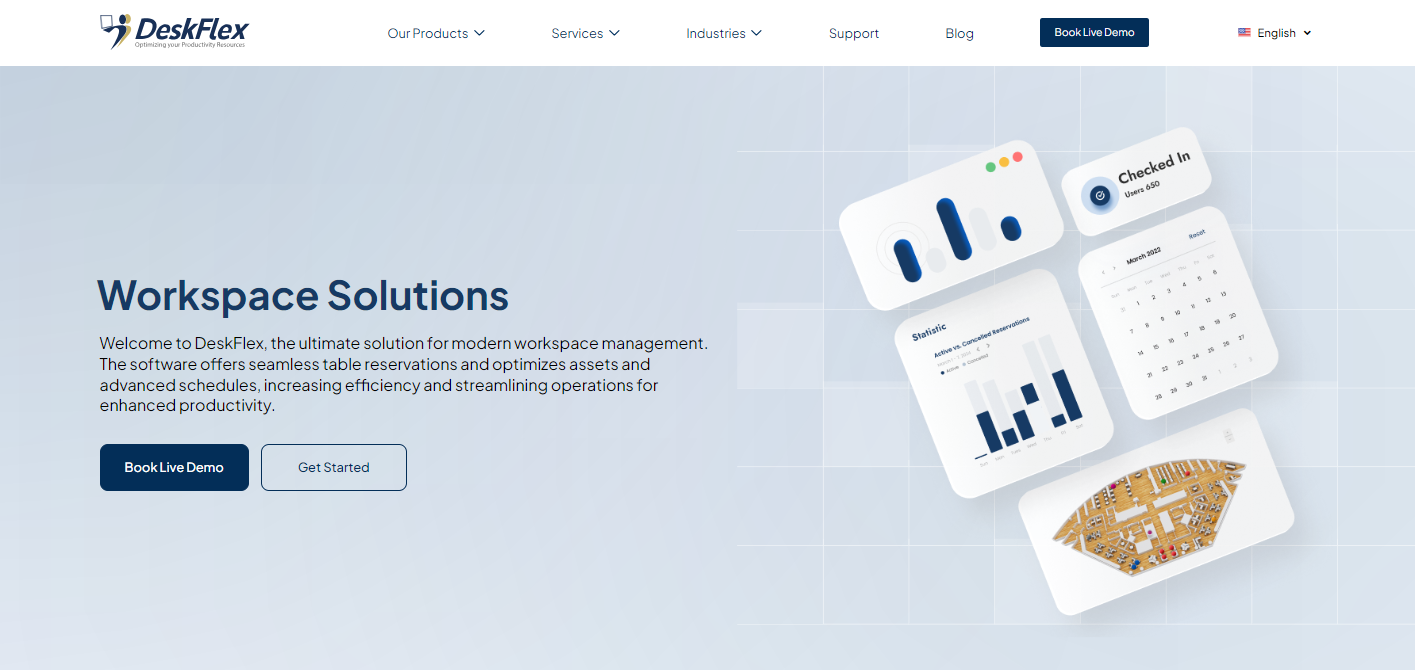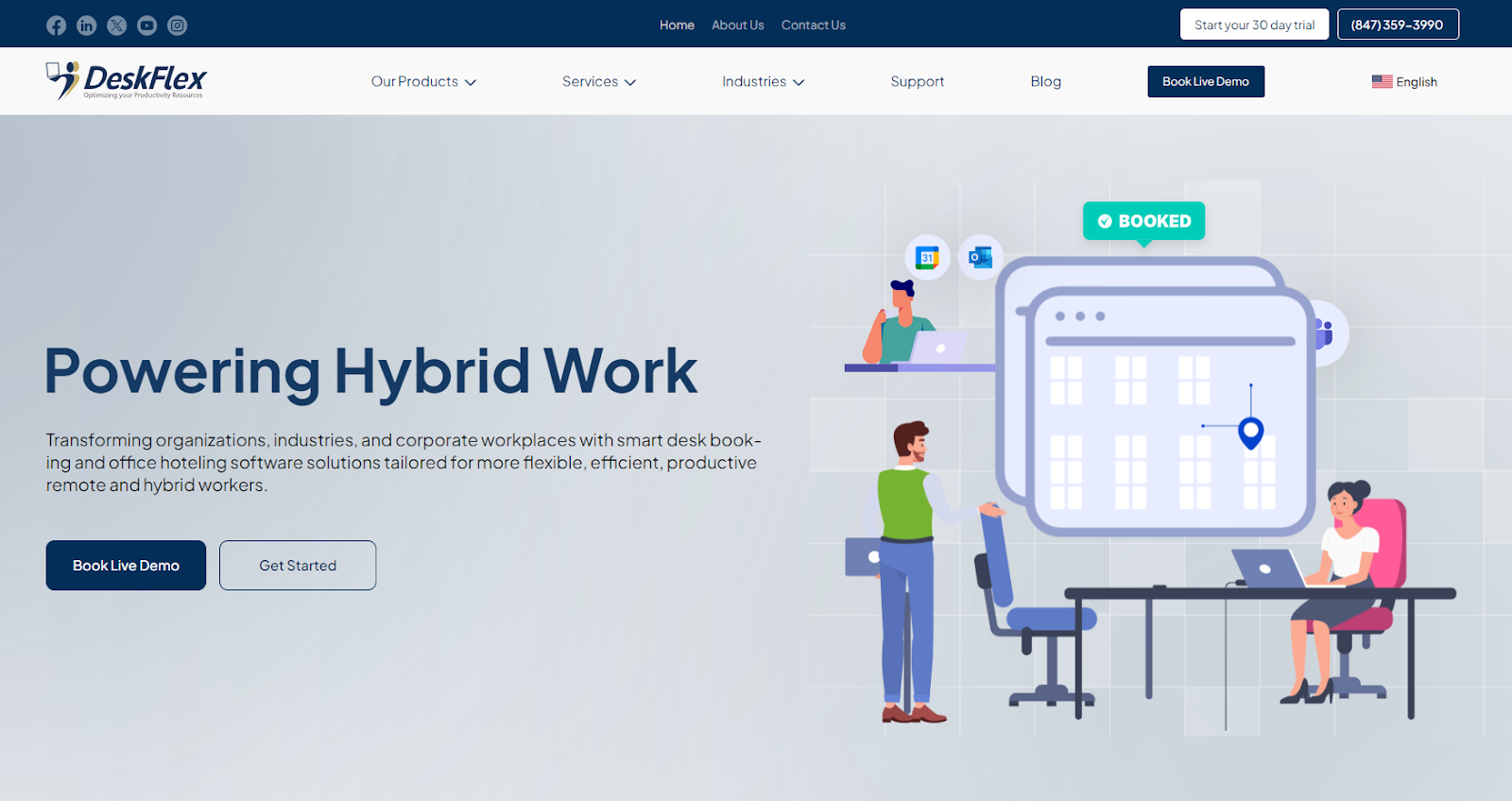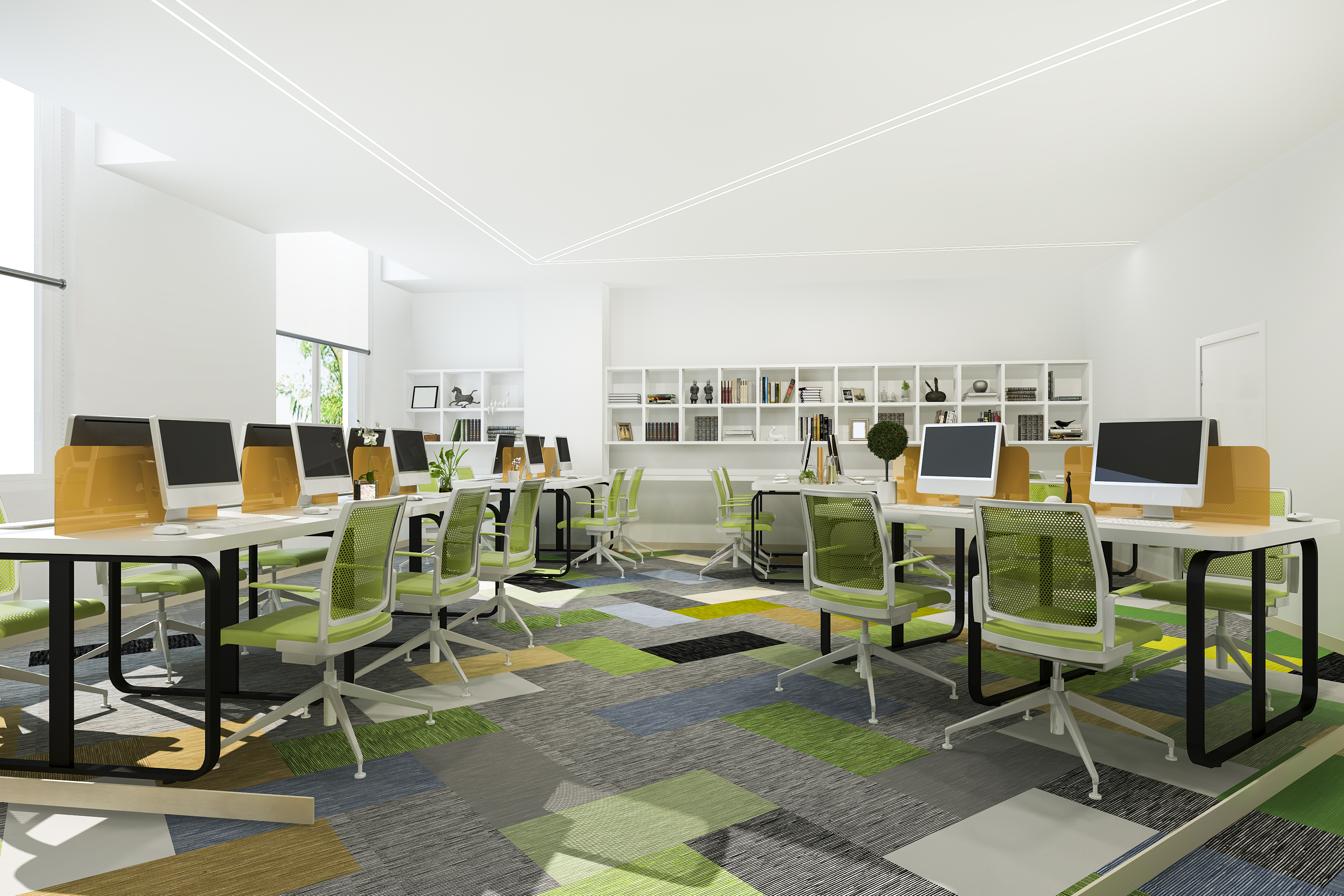
A Guide to Best Office Space Management Tools
Efficient office space management is important for modern businesses aiming to maximize their workspace and improve overall productivity.
As companies embrace hybrid work models, balancing the use of physical office space with employee needs becomes increasingly complex.
That’s where space management software steps in. These tools offer a simplified way to monitor and optimize office space utilization, ensuring that companies can manage their real estate effectively and cut down on unnecessary costs.
In this article, we’ll explore the best office space management software, focusing on how space management software helps businesses organize, allocate, and optimize office resources.
What is Space Management Software?
Office space management tools, commonly referred to as space management software, are digital tools designed to help businesses effectively monitor, manage, and optimize their office spaces.
It provides a centralized platform where companies can oversee everything from desk reservations to meeting room schedules.
This software plays a key role in modern office management by allowing real-time tracking of space utilization and helping managers make informed decisions about how to allocate physical spaces.
Key Features of Space Management Software
Space management software comes equipped with a variety of features that make it indispensable for businesses of all sizes.
Below, we’ll explore the most important key features that help businesses maximize their office space and improve overall efficiency.
Real-Time Space Utilization Data
One of the most valuable aspects of space management software is its ability to provide real-time data on space usage.
This feature allows businesses to track how much space is being used at any given time. It helps identify underutilized areas, allowing companies to reconfigure the office layout to meet evolving needs.
Interactive Office Layout Tools
With space planning software, companies can create interactive office layouts.
This feature allows office managers to visualize how their office spaces are being used and adjust seating arrangements or meeting room placements accordingly.
Whether planning for future space requirements or addressing current inefficiencies, this tool ensures you’re always using your space optimally.
Desk Booking and Hot Desking
For businesses that offer hot desks or flexible seating arrangements, space management software makes it easy to manage desk reservations.
Employees can book desks based on their work schedules, guaranteeing that spaces are used efficiently without overcrowding. This flexibility improves both employee satisfaction and workplace efficiency.
Occupancy Sensors and Visitor Management
Many space management solutions now come with occupancy sensors, which monitor real-time occupancy levels.
These sensors provide actionable insights into space utilization, helping businesses make informed decisions about where to allocate resources.
Analytics and Reporting
Real-time data is at the core of any good space management solution. The ability to generate reports on space usage, meeting room reservations, and other key metrics is invaluable for making strategic decisions.
These insights help companies plan for future space requirements, reduce operating costs, and create a more flexible workplace.
How Software for Space Planning Improves Space Usage
One of the key functions of office space management software is its ability to improve space utilization within an organization.
With detailed data and analytics, businesses can transform how they use their physical spaces, ensuring that every area serves a purpose and contributes to operational efficiency.
Identifying Underutilized Areas
Space management software provides detailed insights into how office spaces are being used, helping businesses quickly identify underutilized areas.
For instance, a seldom-used meeting room could be transformed into a collaborative workspace or quiet zone, helping to maximize space utilization and reduce wasted space.
This reallocation of resources leads to a more efficient use of the company’s real estate footprint, saving both space and money.
Hot Desking and Flexible Workplace Solutions
The growing trend of hot desking and flexible workplaces in a hybrid work environment is reshaping how companies approach office space management.
Space allocation software plays an important role in implementing these strategies.
By using hot desk booking software, businesses can reduce the number of permanent desks, freeing up space for other uses.
Additionally, employees enjoy the freedom to select their workspace based on their needs for the day, improving overall workplace efficiency.
Booking Desks and Meeting Rooms
Office management tool simplifies the process of booking desks and meeting rooms, offering a seamless experience for employees.
With strategic space planning availability, employees can quickly check which desks, meeting rooms, or other bookable spaces are free, making it easier to plan their day.
This approach not only improves space usage but also enhances the overall workplace experience, as employees no longer have to deal with the frustration of scheduling conflicts.
The Role of Space Planning in Office Space Management
Effective space planning is at the heart of efficient office space management. It allows companies to design workspaces that not only enhance productivity but also align with the company’s evolving needs.
Workspaces Optimized
Optimizing the office layout is important for fostering collaboration, promoting productivity, and ensuring efficient use of available space.
Space management software helps businesses design layouts that accommodate different work styles and functions.
Strategic Space Planning
Strategic space planning is essential for businesses that want to stay ahead of their future space requirements.
Strategic planning also reduces the likelihood of wasted or underutilized space, allowing companies to maximize their real estate assets while minimizing unnecessary real estate costs.
Supporting a Hybrid Work Environment
As more companies adopt a hybrid work model, the need for adaptable space allocation has grown.
Space planning tools offer solutions that cater to flexible workplace arrangements, where employees book desks on the days they are in the office.
How Office Space Management Software Helps Your Business
Implementing space management software for empty offices offers a range of benefits for businesses of all sizes.
This technology plays an important role in making the most out of physical workspace while reducing costs. Here’s a closer look at the key advantages:
Maximizing Real Estate Assets
One of the most significant benefits of space utilization software is its ability to help businesses maximize their real estate footprint.
With real-time utilization data, businesses can identify underused areas and reallocate them to more productive purposes.
Cost Savings
Space management software helps companies achieve significant cost savings by reducing the waste associated with underused or inefficient office spaces.
By analyzing space usage patterns, businesses can make data-driven decisions about space allocation, reducing the need for extra square footage and lowering operating costs.
Improved Employee Satisfaction
Creating a flexible workplace that adapts to employees’ needs enhances the overall employee experience and leads to greater employee satisfaction.
With space management software, employees gain more control over their work environment. This flexibility enables workers to choose the spaces that suit their tasks, leading to increased productivity and comfort.
Energy Efficiency
Optimizing office space through space management software can also contribute to significant improvements in energy efficiency.
The software can integrate with building management systems to monitor and control energy consumption, such as adjusting lighting, heating, and cooling in meeting rooms and workspaces that are in use.
Choosing the Right Space Management Software
When selecting the best space planning software for your business, it’s essential to weigh several key factors.
The right solution can transform how your office functions, helping you manage your physical workspace more efficiently and improving both space utilization and employee happiness.
Below are some important considerations to guide your decision:
Scalability
As your business grows, so will your need for additional office space, desks, and meeting rooms.
The space management software you choose should be able to scale with your operations, allowing you to seamlessly manage more office spaces and users without requiring major system overhauls.
Key Features
Look for software that offers features tailored to your business needs.
Essential features include real-time data tracking for space usage, hot desking options, interactive floor plans, and easy-to-use space planning tools.
Integration with Existing Technologies
The chosen software should seamlessly integrate with your current workplace management technologies, such as HR platforms, scheduling systems, and facility management tools.
This can also improve the employee experience by offering them a single platform for booking desks, checking in, and managing their workspaces.
3 Best Space Management Software
When it comes to office space management software, there are a few platforms that consistently rank at the top due to their advanced features, scalability, and ability to integrate with existing workplace technologies.
These tools help businesses maximize their space utilization, manage their real estate portfolio, and create a more efficient and flexible work environment. Here are the top three popular solutions:
1. DeskFlex
DeskFlex is a comprehensive space allocation software designed to meet the needs of businesses of all sizes.
It offers advanced features like desk booking, meeting room scheduling, hot desking, and visitor management, making it ideal for managing hybrid work environments.
Key features:
- Real-time desk and room availability
- Custom permissions control
- Integration with existing technologies
- Support for flexible workspaces
Best for: Businesses looking for an all-in-one platform to manage desks, meeting rooms, and visitors while optimizing space utilization and reducing operating costs.
2. OfficeSpace
OfficeSpace provides a platform for managing desks, meeting rooms, and other office spaces.
Source: OfficeSpace
Its interactive floor plans and detailed space utilization analytics allow businesses to optimize their layouts and make informed decisions about resource allocation.
Key features:
- Real-time desk and room booking
- Interactive office layouts
- Space utilization tracking
- Workplace analytics
Best for: Medium to large businesses looking to streamline space management and plan for future space requirements.
3. Envoy
Envoy is known for its visitor management system, but it also provides a strong platform for desk booking and meeting room scheduling.
Source: Envoy
Envoy is designed for hybrid workplaces, helping employees easily book desks, meeting rooms, and other office spaces with real-time availability updates.
Key features:
- Integrated desk booking and meeting room scheduling
- Real-time desk availability
- Access control integration
- Hybrid workplace support
Best for: Companies looking for an all-in-one solution that combines visitor management, desk booking, and office security for a flexible and safe work environment.
The Future of Office Management Software in Hybrid Workplaces
As hybrid work models continue to shape modern workplaces, businesses need to adopt innovative strategies for managing their office spaces.
Office management tools are increasingly essential for creating efficient, flexible environments that can adapt to fluctuating occupancy levels.
Adapting to the Hybrid Work Environment
Businesses need to rethink how they allocate their office space. Workplace management tools provide real-time data and insights that help organizations plan for these flexible arrangements.
This flexibility also helps businesses to implement hot-desking and shared workspaces effectively, maximizing the use of available resources.
The Impact of Hybrid Work on Real Estate Footprint
As more companies adopt hybrid work models, the need for large, permanently assigned office spaces has diminished.
By integrating workplace technology and strategically reducing their real estate footprint, businesses can achieve long-term cost savings while still providing a flexible and functional workplace for their employees.
Automation and AI in Space Management
Automation and AI are transforming space management by improving workplace operations and maximizing space utilization.
Advanced space management solutions use AI to predict space usage patterns, helping businesses make informed decisions about office layout and resource allocation.
DeskFlex: Your Best Space Management Software
When it comes to choosing the right software, DeskFlex is the top choice.
It offers an all-encompassing solution for businesses of all sizes, providing real-time desk and room booking, seamless automation, and powerful analytics to optimize every corner of your office.
DeskFlex stands out with its ability to integrate smoothly with existing systems like Zapier and Microsoft Teams, assuring a hassle-free experience.
With DeskFlex, your organization will stay ahead in the evolving world of hybrid work. Whether you’re managing a small office or a large real estate portfolio, DeskFlex’s advanced features ensure your office spaces are optimized and your business operates at peak efficiency.
Ready to take control of your office space? Schedule a demo today and see how DeskFlex can transform your workplace efficiency.
FAQs About Office Space Management Software
What is space management software?
Space management software is a digital tool designed to help businesses monitor, manage, and optimize their office spaces.
It provides real-time data on space utilization, helping companies make informed decisions on desk reservations, meeting room scheduling, and overall office layout.
This software is particularly valuable in hybrid work environments, where employees may not always be in the office.
What is a space management system?
A space management system refers to the broader framework used to control and optimize how office spaces are allocated and used. It combines hardware, such as occupancy sensors, with software tools like desk booking systems and real-time analytics.
What is an example of space management?
An example of space management in action is a business that uses space management software to implement a hot desking policy.
By allowing employees to book desks based on their schedules, the company can reduce the number of permanent desks required and optimize office layouts.
What is space planning software?
Space planning software is a tool that allows businesses to design and optimize their office layouts based on real-time data and projected needs.
This software helps with strategic space planning, ensuring that businesses can adapt their office layouts as their needs evolve, whether for future growth, accommodating hybrid work environments, or improving collaboration and productivity.




















































